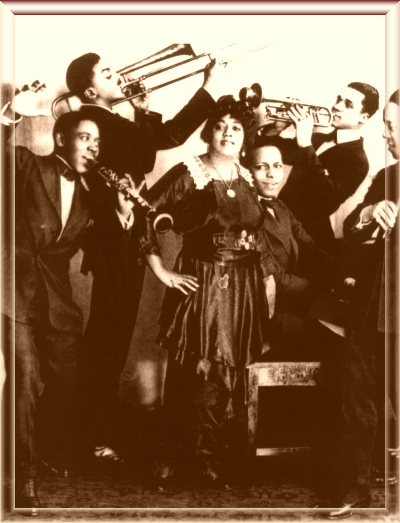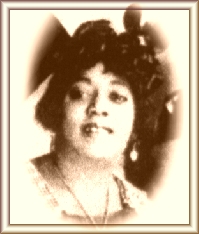South Australian Blues Society
(It's the old 1999 website I have dragged out of the archives for you to have a look at!)
![]()
BLUES WOMEN by Everlovin’ Trev
Mamie Smith – Harlem jazz performer
Since the mid-1960's, the blues have become synonymous with (mostly male) guitar virtuosity, with names like 'Eric Clapton' and 'Peter Green' to begin with, and more lately 'Stevie Ray Vaughn', 'Gary Moore', and at home in South Australia 'Chris Finnen'. But it wasn't always like that. Once the singer, the band, and even the dancers formed an organic whole, and among the singers were many women who earned for their music the title, 'Classic Blues'. This tradition has become largely lost - or perhaps 'forgotten' is a better word. In any case, in this and the following series of articles, I want to revive this memory by recounting the stories of some of the great classic blues singers. To be strictly accurate, all of the women I plan to discuss should not be considered classic blues singers in as much as the title is traditionally reserved for those who fronted big bands solely as vocalists, but the female voice is what all have in common.
The history of blues music is replete with tales of the agents of the record companies or folklorists, men like Alan Lomax (who discovered Muddy Waters) and Ernie Oertle (who first recorded Robert Johnson) roaming the prisons and plantations of the southern states of the U.S. in search of blues musicians, but the first blues recording did not come from the Mississippi Delta, and nor did it issue from the brothels of New Orleans or the barrel-houses of Memphis. The first blues record was cut in New York.
Furthermore, the recording was not made by some noted male blues singer or composer, such as Charlie Patton or W.C. Handy, it was recorded by a woman, a comparatively little-known Harlem jazz performer called Mamie Smith. In August 1920, backed by an African-American band, Smith recorded 'Crazy Blues', a song written by Perry Bradford.

In the early years of the century, both records and the phonograph on which they were played were expensive and so their market was almost completely restricted to the wealthier middle-class. It was the tastes of this group that determined the kind of music that was commercially available and these people did not know that they liked blues, so no blues was recorded.
That middle-class tastes were to change so decisively was largely due to Bradford's powers of persuasion, for he managed to convince a rather reluctant music company called Okeh to record two of his compositions, 'That Thing Called Love' and 'You Can't Keep a Good Man Down'. Okeh wanted the songs recorded by a Euro-American vaudeville artist called Sophie Tucker but she was unavailable, so Mamie Smith - Bradford's original choice - got the job.
The record was sufficiently successful that Okeh was willing to have Smith do another of Bradford's compositions, a number called 'Crazy Blues'. This time the outcome was much more spectacular. The track sold 100,000 copies in the first month of it's release and blues music became an overnight commercial proposition, as did Mamie Smith. (Perhaps this is the origin of the idea of classic blues: in the style and format of the first recorded blues).
Smith, born in Cincinnati in 1883, was able to tour regularly with her own band and earned $1,500 a week at the height of her fame. Among music critics she is known more for her luxurious life-style and expensive clothing than for her singing, but her records have been described as selling in prodigious quantities, so whatever musical limitations she may have possessed did not affect her record-buying middle-class public. She died in 1940, the first grand lady of the blues.

The trail that Mamie Smith blazed was soon followed by a host of other singers, among them Lucille Bogan and Bessie Smith, Victoria Spivey and Memphis Minnie, Dinah Washington and Alberta Hunter, to name just a few of the original group. More recently this path has been taken up in England by Jo Ann Kelly, and in the U.S. by Rory Bloch, Koko Taylor and Bonnie Raitt.
Everlovin’ Trev
